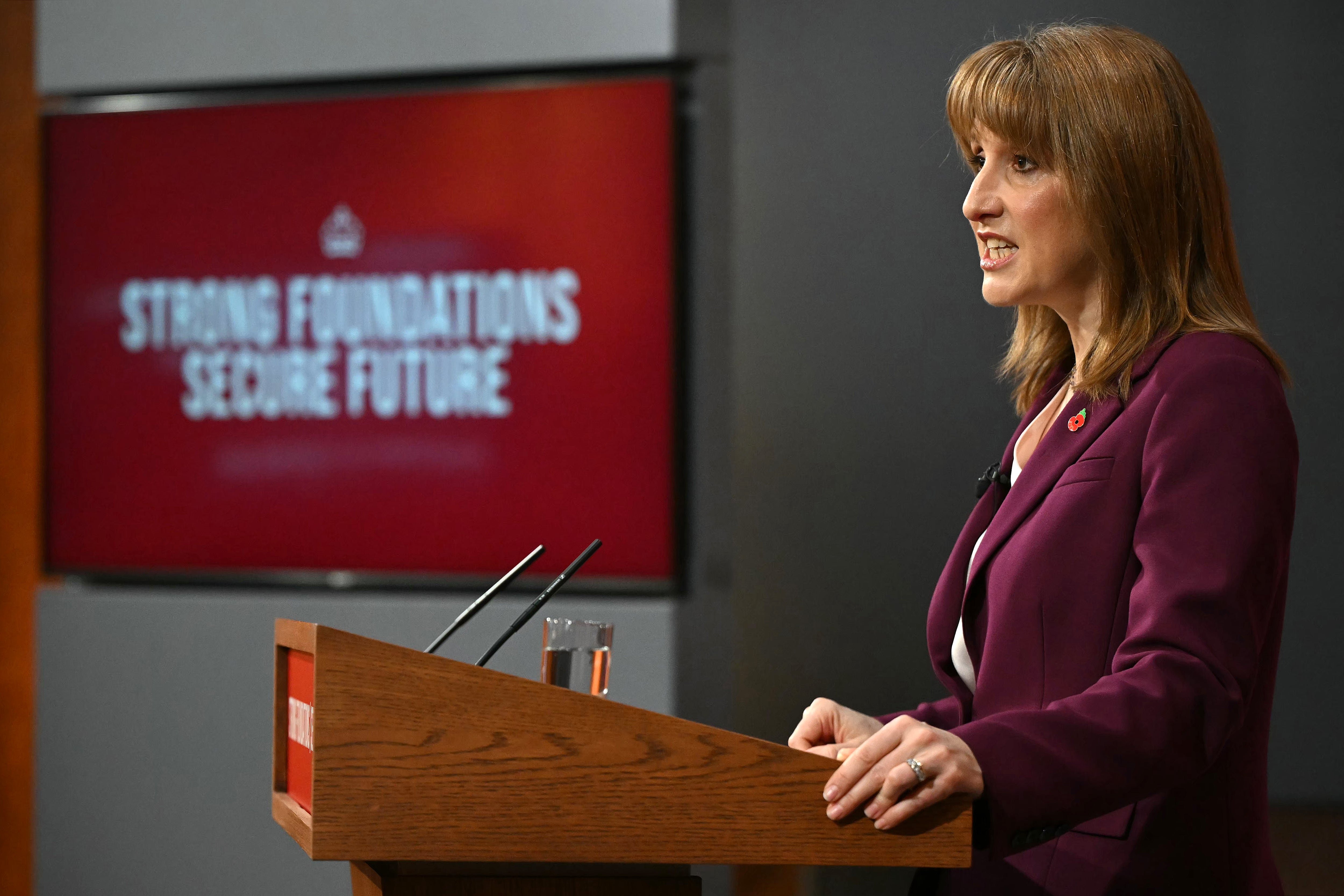Business
MPs urge Reeves to tax online betting games to reflect the harm they cause

The government has been told by MPs that it should not “cave in to industry scaremongering” about the negative effects of taxing online betting games, and that it should tax them at a rate that reflects the harm they can cause.
The recommendation from the cross-party Treasury committee comes just weeks ahead of Rachel Reeves’s Budget, in which she will be looking to plug a substantial gap in the public finances.
In its report, released on Friday, the committee warned that online betting can lead to harmful, addictive, high-frequency gambling that delivers no benefit to the people taking part, their families or their communities.
The report urged the government to “more sharply recognise that different types of gambling inflict different levels of harm”, and recommended that this be reflected in its approach to taxing the activity.
The committee’s report said that while various forms of gambling, ranging from seaside arcades and bingo through to betting on the races and football, are safely enjoyed by many people, there is “another side to the industry”.
The shift towards online betting games has picked up pace in recent years, with the proportion of the “gross gambling yield” associated with remote gaming rising from 12 per cent in 2014 to 44 per cent in 2024.
The committee had called for evidence of the possible effects of taxing the activity, as it held a series of sessions examining the choices faced by the chancellor in her forthcoming Budget. It said it rejected the industry’s assertion that gambling causes no social ills. It also heard evidence that it said both supported and challenged the gambling industry’s concern that increased taxation could drive more customers to the black market.
The committee said it recommends that the government examine how to tackle black-market gambling, and consider whether additional anti-tax-avoidance measures were needed.
The chair of the Treasury select committee, Dame Meg Hillier, said: “Whether at a local racetrack or a seaside arcade, for many people, gambling is a fun pastime enjoyed with family and friends. But we heard that the industry is hiding its more insidious parts behind the friendly facade of its traditional, cultural forms.
“For too many people, the highly addictive and harmful nature of online betting games has seriously impacted their lives and the lives of those around them. The impacts of problem gambling in our communities are plain to see, and the industry’s boldfaced claim to our inquiry that it does no social harm is staggering.
“Online betting games are extracting huge amounts of money from people who have been funnelled into the most addictive, harmful corners of the industry via their love of sports or the occasional game of bingo. We are urging the government not to cave in to industry scaremongering, and to tax online betting games at a rate that reflects the level of harm they inflict.”
The chief executive of the Betting and Gaming Council (BGC), Grainne Hurst, said: “Further tax increases on the regulated online sector risk undermining consumer protections by pushing players towards the unsafe, unregulated black market – while reducing Treasury revenues and cutting the vital funding our members provide to British sport, including horseracing, football, rugby league, darts and snooker.
“We have always recognised that betting and gaming can lead to harm for a small minority, which is why our members are investing more than ever in safer gambling – including new stake limits on online gaming, enhanced affordability checks, swift data-driven interventions, robust advertising safeguards, and funding for a new £100m statutory levy for research, prevention, and treatment to tackle problem gambling and related harm.”

Ms Hurst added: “BGC members contribute £6.8bn to the economy, generate £4bn in tax, and support 109,000 jobs, while facing an effective tax rate of up to 80 percent when duties are combined with corporation tax, business rates, national insurance, VAT, and the new statutory and economic crime levies.
“Much is at stake in the chancellor’s Budget. Get it wrong, and it’s not just jobs and growth that will suffer, it’s safer gambling itself. To protect consumers and support a safer, stronger industry, we must keep gamblers playing within the regulated market.”
A spokesperson for Flutter UK and Ireland, whose brands include Paddy Power, Sky Betting & Gaming, Sportsbet and Tombola, said: “It’s not scaremongering to suggest that tax rates of 50 per cent on machine games and online games such as bingo – as demanded by the Institute for Public Policy Research – could have a significant impact on the industry, jobs and investment.
“A tax rise is not a free hit.”
Business
SFIO probes IndusInd’s Rs 1,960 crore derivatives hole – The Times of India

MUMBAI: Serious Fraud Investigation Office (SFIO) has opened a formal probe into IndusInd Bank after a Dec 23, 2025 letter triggered an investigation under the Companies Act, 2013, over accounting lapses tied to internal derivative trades.In a filing, the bank said SFIO, under the MCA, seeks information after the lender flagged on June 2 issues spanning internal derivatives, unsubstantiated “other assets/liabilities”, and microfinance interest/fee income. It disclosed the update on Dec 18, pledged full cooperation, and posted details on its website.Derivatives irregularities have hit P&L by about Rs 1,960 crore as of March 31, 2025, eroding reported net worth by roughly 2.3% as of Dec 2024. Earlier profits were overstated as notional gains flowed into P&L while losses sat parked as assets, inflating NII and earnings quality. The derivatives irregularities saw several members of the senior management stepping down with the board bringing in Rajiv Anand from Axis Bank to head the private lender.The bank recognised the losses, absorbed pain in its FY25 earnings which tipped the bank into a Q4 FY25 net loss after one-off write-offs/provisions. Capital/net worth took a 2–2.5% post-tax hit, trimming buffers and nudging growth appetite and capital pricing.The derivatives loss resulted in the shares of the bank sliding as investors reassessed earnings credibility and governance. The scrutiny also sharpened on the board/management/audit committees, intensifying regulatory pressure and SFIO oversight.
Business
Navi Mumbai airport opens today with 30 domestic flights – The Times of India

MUMBAI: Navi Mumbai International Airport (NMIA) opens to commercial operations on Thursday after years of missed deadlines, opening a second gateway for air travel in the Mumbai region. The day will see four airlines operating about 30 domestic flights at India’s newest greenfield airport. The first scheduled arrival will be an IndiGo flight from Bengaluru, touching down at 8 am, while the first departure will also be operated by IndiGo, a morning service from Navi Mumbai to Hyderabad, scheduled to take off at 8.40 am. The terminal building will open to departure passengers around 6.40 am, said an NMIA spokesperson.“On Day One, domestic services will be operated by IndiGo, Air India Express, Akasa Air and Star Air connecting NMIA to nine destinations across India. The airport will handle 15 scheduled departures on the first day,” said an NMIA spokesperson.“During the initial phase, NMIA will operate between 8 am and 8 pm, with up to 24 scheduled daily departures to 13 destinations and the capability to manage up to 10 aircraft movements per hour. From Feb 2026, operations are planned to progressively scale up to round-the-clock services,” the spokesperson added. “Passenger services from day one will be supported by Digi Yatra-enabled contactless processing at designated touchpoints, along with trained terminal staff across kerbside, check-in, security and boarding areas,” the spokesperson said. Conventional check-in counters too will be available for passengers not opting for Digiyatra. Retail and food and beverage offerings have been curated with a focus on affordability and local preferences, the airport said.In its initial phase, NMIA opens with terminal 1 and one operational runway; the terminal building has a capacity to handle 20 million passengers annually, but it is expected to touch that number before mid-2026. The terminal building can accommodate about 2-3 million passengers beyond its declared capacity. The new airport is 45-50 km from North Mumbai, 35-40 km from South Mumbai and 35-45 km from the eastern suburbs.
Business
Logistics IPO: Yatayat Corporation files Sebi papers to raise funds; growth surge puts road freight firm in focus – The Times of India

Logistics and transportation services provider Yatayat Corporation India Ltd has filed draft papers with markets regulator Sebi to raise funds through an initial public offering, as the road freight segment continues to see strong demand, PTI reported.According to the draft red herring prospectus (DRHP), the proposed IPO will comprise a fresh issue of up to 77 lakh equity shares along with an offer for sale (OFS) of up to 56 lakh equity shares by a promoter, taking the total offer size to as many as 1.33 crore shares.The company said proceeds from the fresh issue will be used primarily to meet working capital requirements and for general corporate purposes.Yatayat Corporation operates in the road logistics space, with a focus on Full Truck Load (FTL) transportation, offering point-to-point freight movement across major logistics corridors in the country. Its operations are supported by a network of 34 branches and one warehouse spread across 12 states.The company services a diversified client base spanning agriculture and agri-inputs, building materials and construction, chemicals and allied industries, energy and power, engineering and industrial manufacturing, IT and technology solutions, metals and mining, textiles and apparel, as well as other industrial and consumer segments.On the financial front, Yatayat Corporation reported revenue from operations of Rs 448.13 crore in FY25, up from Rs 348.34 crore in FY24. Profit after tax rose to Rs 30 crore in FY25, compared with Rs 15 crore in the previous financial year.Unistone Capital has been appointed as the sole book-running lead manager to the issue, the draft papers showed.
-

 Fashion7 days ago
Fashion7 days agoIndonesia’s thrift surge fuels waste and textile industry woes
-

 Business7 days ago
Business7 days agoBP names new boss as current CEO leaves after less than two years
-

 Tech7 days ago
Tech7 days agoT-Mobile Business Internet and Phone Deals
-

 Sports7 days ago
Sports7 days agoPKF summons meeting after Pakistani player represents India in kabaddi tournament
-

 Entertainment7 days ago
Entertainment7 days agoIndia streamlines visa rules in boost for Chinese professionals
-

 Sports7 days ago
Sports7 days agoUWCL grades for all 18 teams: Leuven get A+; Barça an A-, PSG fail
-
Sports5 days ago
Alabama turned Oklahoma’s College Football Playoff dream into a nightmare
-

 Entertainment7 days ago
Entertainment7 days agoRadiation fears rise after cracks found in $2 billion Chernobyl shield






